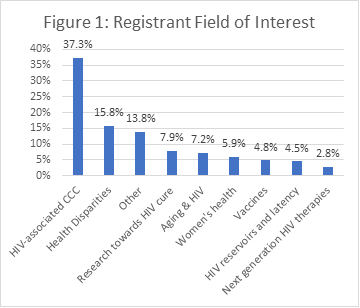2024 Workshop for Early Career Investigators in HIV Executive Summary
Elisabet (Lis) Caler, Ph.D., and David Chang, Ph.D.
The NIH Workshop for Early Career Investigators (ECIs) in HIV, organized by the NIH Office of AIDS Research (OAR) in collaboration with 18 NIH Institutes, Centers, and Offices (ICOs) on April 24, 2024, marked the third successful iteration of this annual event. A goal of the NIH Strategic Plan for HIV and HIV-Related Research is to “build human resource and infrastructure capacity to enhance sustainability of HIV research discovery and the implementation of findings by a diverse and multidisciplinary workforce.” With over 500 attendees from around the world, the workshop did just that by offering valuable resources to ECIs in HIV including advice and presentations from other ECIs, mentors, and OAR and NIH employees. Watch video recordings of the workshop here.
Participation
 The ECI workshop boasted high interest with 1,078 registrants, of whom 558 actively participated, marking an impressive 51.7 percent engagement rate. The event attracted a diverse global audience, with significant representation from Africa, notably Uganda. Attendees hailed from 37 U.S. states and territories as well as from 48 countries spanning every continent except Antarctica, highlighting the workshop’s worldwide reach. The registrant self-reported field of interest was dominated by HIV-associated comorbidities, coinfections and complications (CCC), health disparities, and research towards an HIV cure, as illustrated in Figure 1.
The ECI workshop boasted high interest with 1,078 registrants, of whom 558 actively participated, marking an impressive 51.7 percent engagement rate. The event attracted a diverse global audience, with significant representation from Africa, notably Uganda. Attendees hailed from 37 U.S. states and territories as well as from 48 countries spanning every continent except Antarctica, highlighting the workshop’s worldwide reach. The registrant self-reported field of interest was dominated by HIV-associated comorbidities, coinfections and complications (CCC), health disparities, and research towards an HIV cure, as illustrated in Figure 1.
Format of the event
The event began with an exploration of OAR’s overarching role and fiscal responsibilities, followed by mentorship sessions replete with practical advice and real-world examples from investigators from diverse backgrounds, career stages, and research interests. Attendees gained valuable insights into available resources, with a specific focus on those developed by OAR, such as the OAR Data Hub, an interactive platform that hosts data on the NIH HIV research portfolio. Moreover, the workshop provided a deep dive into the roles of NIH Program Officers (also called Program Directors) and Scientific Review Officers, describing best practices, pitfalls to avoid, and guidance for navigating the grant application and peer review processes. In addition to these presentations, participants received an infographic e-booklet summarizing information regarding individual NIH ICOs that support HIV research and training and funding opportunities specifically aimed at ECIs.
The ECI Workshop’s interactive format offered attendees opportunities to engage with more than 40 NIH Program and Review representatives from 15 ICOs in smaller breakout sessions. This facilitated personalized interactions, fostering a conducive environment for networking and knowledge exchange. Participants also took part in polls to interact with each other and further gauge their understanding of the topics discussed. Coming into the workshop, some participants had limited knowledge of NIH grants processes.
Survey Results
In a poll that preceded the session on NIH Program, 24 percent of respondents were unclear whether Program Officers can provide general feedback on a draft application, and 40 percent had never interacted with a Program Officer about an idea for an application. Before the session on NIH Review, 22 percent of respondents were unsure whether Scientific Review Officers personally review, rank, and score applications. Presentations given by NIH staff, along with direct interactions with NIH representatives, helped to clarify processes for the attendees.
Participants were encouraged to provide feedback via a survey at the end of the program to inform future workshops and OAR’s broader efforts to support ECIs. Overall, all survey participants stated they learned new information from the ECI Workshop. Although survey responses were modest (10 percent of the attendance), the organizers received useful information to improve the next event. Breakout rooms, sessions describing the roles of Scientific Review Officers and Program Officers, and presentations on funding opportunities for ECIs provided the most useful information according to the survey respondents. Mentor talks and the presentation “Resources for Early Career Investigators in HIV” also captured positive feedback; however, some participants noted the limited time and the desire to dive further in-depth into resources and the OAR Data Hub. Despite this, respondents recognized the utility of the tool, providing feedback noting “The interactive nature of the hub and ability to access information on funded projects” and “The ability to look at the research track record of particular researchers to know if they are a good fit for mentorship and future study.” Some participants commented on the insufficient time to fully understand the complexity and potential of the Data Hub, an aspect of the workshop that will be reconsidered. Some topics suggested for future coverage included more discussion about grant budget formulation, more successful ECI lived experiences, a mentor panel that could be available to ECI Workshop participants, and more information about specific study sections.
Takeaways
Overall, the ECI Workshop exemplified OAR’s commitment to supporting ECIs by equipping them with the knowledge, tools, and networking necessary for success in their path forward in their research career. The workshop also fostered collaboration across NIH ICOs with some presenters and many attendees from ICOs across NIH. This NIH-wide collaboration was instrumental in pooling together expertise and resources, enhancing the workshop’s impact and reach. The workshop’s resounding success underscores the value it delivers to the global research community, further demonstrating OAR's collaborative efforts to support and sustain HIV workforce development needed to end the HIV pandemic.
This page last reviewed on June 18, 2024

